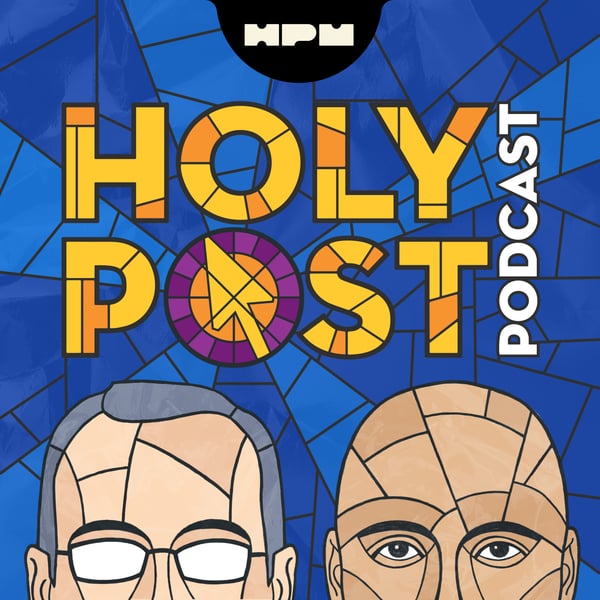Jesus and John Wayne Episode 3: Tender Warriors (The ’90s - ’00s)
The Holy Post
Phil Vischer
4.6 • 4.1K Ratings
🗓️ 9 July 2021
⏱️ 66 minutes
🧾️ Download transcript
Summary
Calvin University history professor Kristin Kobes Du Mez joins Skye Jethani to discuss her bestselling book, “Jesus & John Wayne.” In this episode, they examine why white evangelicalism left behind some of its militant rhetoric after the Cold War ended in the early 1990s to embrace a kinder, gentler approach epitomized by the Promise Keepers movement, and how an aggressive vision of Christian masculinity returned after September 11, 2001. Plus, why an emphasis on racial reconciliation ultimately doomed Promise Keepers, and how other ministries learned to avoid any talk about race or justice.
Part 1 - Promise Keepers and Therapeutic Christianity
Part 2 - Servant Leaders and Racial Reconciliation (15:36)
Part 3 - Purity Culture and Fragile Masculinity (32:47)
Part 4 - 9/11 and the Neo-Calvinists (48:38)
Jesus & John Wayne: How White Evangelicals Corrupted a Faith and Fractured a Nation: https://amzn.to/3l6mkH
(The Holy Post is supported by our listeners. We may earn affiliate commissions through links listed here. As an Amazon Associate, we earn from qualifying purchases.)
Transcript
Click on a timestamp to play from that location
| 0:00.0 | In January of 2016, a candidate for the presidency of the United States spoke at a small Christian |
| 0:06.2 | college in Iowa. He warned about Muslims and immigrants, he called his opponents stupid and |
| 0:12.0 | pathetic. He warned the audience that Christianity was under siege, and he boasted that he could |
| 0:17.5 | stand in the middle of Fifth Avenue and shoot somebody, and he wouldn't lose any voters. |
| 0:22.5 | The crowd applauded. And to the shock of many, Evangelicals went on to vote for him in record numbers. |
| 0:28.4 | This is the story of how Evangelicalism became corrupted and fractured a nation. |
| 0:58.7 | My name is Skye Jitani. I'm the co-host of the Holy Post podcast. In the last episode, |
| 1:10.4 | history professor Kristen Kobes-Dume took us through the rise of the religious right in the 1970s |
| 1:16.0 | and 80s, and how the Cold War mindset of militant masculinity was adapted by Evangelicals for |
| 1:22.2 | the culture war between liberals and conservatives. This week our conversation focuses on the 1990s |
| 1:28.4 | and early 2000s. It was a time of promise keepers and servant leaders of purity culture and |
| 1:34.5 | mega-church pragmatism. Dume explains why this era was so confusing for Evangelicals and how |
| 1:40.7 | even positive trends, like a new focus on racial reconciliation, foreshadowed the deep divisions |
| 1:46.5 | over race and justice we're seeing today. Our conversation is split into four parts, |
| 1:51.8 | and timestamps for each one can be found in the show notes. Welcome to episode 3 of Jesus and |
| 1:57.7 | John Wayne. Okay, so we've talked quite a bit about how the Cold War shaped a lot of American |
| 2:10.2 | Evangelicalism in the 20th century, but then in the early 1990s the Cold War ended with the fall |
| 2:16.4 | of the Soviet Union, the fall of the Berlin Wall, the Eastern block countries coming more into |
| 2:22.0 | a line with the West and the EU. Describe how the early 90s began to change American Evangelicalism |
| 2:28.7 | and particularly the masculinity movement or the definition of masculinity in that era |
| 2:36.2 | and how it was trying to find its way. Yeah, the 1990s are such an interesting decade for this |
| 2:44.6 | larger story. I think for younger listeners, listeners who are younger than the two of us are, |
... |
Please login to see the full transcript.
Disclaimer: The podcast and artwork embedded on this page are from Phil Vischer, and are the property of its owner and not affiliated with or endorsed by Tapesearch.
Generated transcripts are the property of Phil Vischer and are distributed freely under the Fair Use doctrine. Transcripts generated by Tapesearch are not guaranteed to be accurate.
Copyright © Tapesearch 2025.

